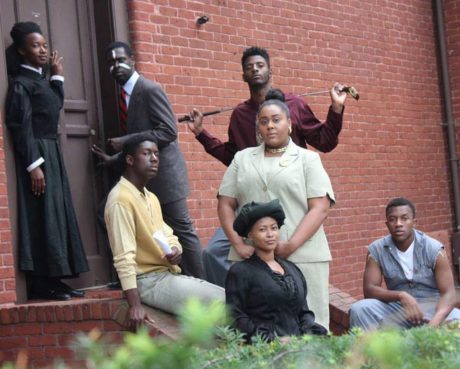August Wilson made it his lifelong project to chronicle the African American experience in every decade of the 20th century with his Pittsburgh Cycle. With its production of Radio Golf, Howard University faced the difficult task of putting on the last play of “theater’s poet of Black America” [From August Wilson, Theater’s Poet of Black America, Is Dead at 60, by Charles Isherwood, in The NY Times, on October 3, 2005]—and they did it with a conviction and earnestness that brought Wilson’s message to life.

Harmond Wilks (Jason M. Jones), the successful proprietor of a real estate agency, has grand plans with his friend and business partner Roosevelt Hicks (Jabari Denson) to redevelop the Hill District in Pittsburgh, PA. It is 1997, a time of great opportunity, and Harmond seems all set to be elected mayor with the staunch support of his wife Mame (Charmaign Davis). There’s only one problem: the owner of one of the houses set for demolition is surprised to discover that a) he no longer owns his home and b) it is about to be destroyed. When it is revealed that the house was acquired by the real estate agency under questionable circumstances, Harmond must face a choice: to continue as planned, or to do what is right…and deal with the consequences.
Jones’ Harmond warms into the role as the play goes on, bringing out both Harmond’s naturally calm demeanor and his growing passion as he struggles to stand up for what he believes. Denson plays the flamboyant Roosevelt, whose expressions of pride mask his denial that success can come at the expense of one’s dignity.
Old Joe (Gregory Banks) and Sterling Johnson (Tre’mon K. Mills) demonstrate that beneath wide smiles and humorous eccentricities can lie a foundation of steel, and a solid understanding of who one is and where one comes from. Wilson’s work tells us that this is far from easy—even Harmond, who by all accounts is successful, is constantly being reminded of the limitations provided by the color of his skin: that he cannot be mayor to both black and white, or that, “nobody’s gonna vote for an angry mayor.” In this play, Wilson weaves issues of race, class, and gender into the rich fabric of the Pittsburgh Cycle.
Director Eric Ruffin does not shy away from the play’s connection to Wilson’s previous works. Together with Choreographer Khalil Green, he uses the transitions between scenes to give us glimpses of Aunt Ester and Black Mary, characters who are featured in other plays in the cycle and gain additional significance in the course of this play.
Aunt Ester and Black Mary appear, ghostlike, in early 20th-century gowns and glide across the stage, aided by the eerie blue and red lights created by Designer George Epting and the rhythmic drumming by Sound Designer T.W. Starnes. Costume Designer Michael Murray contrasts these black gowns with the rich colors of the 1990’s elite, and the worn jeans and old blazers of the not-so-wealthy.
This is no easy play, and there are no easy answers. Radio Golf forces audiences to confront the play’s issues in their own lives, resonating with many people’s experiences and challenging the assumptions of others—which is particularly significant in a time when too many claim that we live in a “post-racial” world.
Howard University’s powerful production of Radio Golf allows us to think about these issues through the lives of August Wilson’s richly drawn characters, leaving audiences voicing their agreement or pondering something new.
Radio Golf plays at Howard University through August 15, 2016, at the Al Freeman, Jr. Environmental Theater Space—2455 6th Street NW, in Washington, D.C. For tickets, call the box office at (202) 806-7700, or purchase them online.
RATING:





